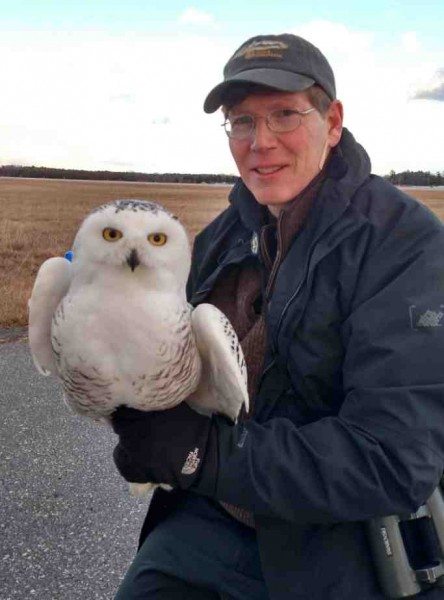I knew posting the following memo on SNOWstorm’s blog was going to be a challenge. The reason for this is that it honors one of SNOWstorm’s leaders and founders, Scott Weidensaul, who happens to be one of the most humble and respectful people I know. However, among our extended SNOWstorm team of collaborators, we all felt the following news had to be highlighted. Here is the main story:
 On 13 May 2017, the Council of Trustees at Kutztown University in Pennsylvania awarded Scott Weidensaul with an honorary doctorate degree. This is a prestigious recognition only awarded to distinguished personalities who contributed to a specific field or to society in general and has made a notable contribution to society. Moreover, it acknowledges their exemplary accomplishments and achievements that serve a greater good.
On 13 May 2017, the Council of Trustees at Kutztown University in Pennsylvania awarded Scott Weidensaul with an honorary doctorate degree. This is a prestigious recognition only awarded to distinguished personalities who contributed to a specific field or to society in general and has made a notable contribution to society. Moreover, it acknowledges their exemplary accomplishments and achievements that serve a greater good.
Scott’s honor is very well-deserved. Through complete dedication to the advancement of appreciation of natural history, Scott has been an active and successful writer, connecting people with natural history; has taught and mentored young conservationists for several decades; and has kept busy conducting cutting-edge scientific research while being at the forefront of the crucially important link between science and education.
I have been lucky to know Scott for several years now and can assure that this is all so true. And of course, as humble and gentlemanly as only he can be, Scott didn’t want us to make too many waves about it. He reported being more than uncomfortable with it being highlighted. “I acknowledge the fact that a honorary doctorate is a long, long way from the real thing,” he said, referring to a classic Ph.D., which he is well aware of from working alongside many Ph.D. researchers throughout his career. In fact, his very own wife, Amy, is just about to complete her Ph.D. thesis. Scott has a point, because recipients of honorary doctorate degrees do not earn the degree directly through academic achievements, but rather with generous and altruistic actions or lifetime accomplishments that benefit a community, nation or humanity in general.
But I believe this is where Scott and I disagree. It is true that a Ph.D. degree needs true academic dedication and the piling up of long hours conducting research, in most cases spanning 4 to 5 years. But honorary doctorate degrees are awarded to a very limited number of extraordinary people that actually dedicated their life to a cause. So, I hope you will all share the pride of this great success and tip your hat in Scott’s honor. This, once more, shows the depth of SNOWstorm’s team and the quality of its people.

Scott Weidensaul keeps a firm grip on Brunswick, Project SNOWstorm’s first tagged owl in Maine. (©Chris DeSorbo)
Following are in-brief, some of Scott Weidensaul’s greatest accomplishments:
Scott grew up in eastern Pennsylvania and attended Kutztown University back in the late 1970s before beginning his naturalist and author career. His current launching pad is still located in the same general area of eastern Pennsylvania, from where he travels the world to give lectures on conservation and nature. He also oversees the ornithological programs for National Audubon’s Hog Island Center on the coast of Maine.
Scott has written more than two dozen books, including the recent Peterson Reference Guide to Owls of North America and the Caribbean, published in 2015. His writing has appeared in dozens of general audience publications, including Audubon (for which he is contributing editor), Bird Watcher’s Digest and National Wildlife, among many others. Scott has also contributed to a number of technical scientific papers published in international peer-reviewed journals.
Scott is an active field researcher whose work focuses on bird migration. Along with Dave Brinker and Steve Huy, is a co-director of Project Owlnet, a collaborative effort among nearly 125 banding and research stations across North America studying owl migration. He has directed a major effort to study the movements of northern saw-whet owls, one of the smallest and least-understood raptors in North America.
Of course, most of you know that Scott co-founded Project SNOWstorm, which uses cutting-edge tracking technology to study snowy owls, and is a founder of the Critical Connections project, which is tracking the migration of birds that breed in Denali National Park in Alaska. He is also part of a continental effort to understand the rapid evolution, by several species of western hummingbirds, of a new migratory route and wintering range in the East.
Scott was a finalist for the 2000 Pulitzer Prize in general nonfiction for his book, Living on the Wind: Across the Hemisphere with Migratory Birds.
Scott is a long-time board member at Hawk Mountain Sanctuary, and is a board member and volunteer curator at the Ned Smith Center for Nature and Art, both in Pennsylvania.
SNOWstorm team member Dr. JF Therrien is senior research biologist at Hawk Mountain Sanctuary in Pennsylvania, and has been studying snowy owls in the Arctic for years with Laval University in Québec.


4 Comments on “SNOWstorm’s co-founder receives prestigious recognition”
Congratulations, Scott! I’ve admired you and your work from a distance for many years, have read your books, and listened to you speak. The honorary Ph.D. is well-earned and well-deserved!
Very happy to hear the news. Congratulations, Scott! I enjoy reading your reports on Snowy Owls and appreciate your time consuming effort! Your book, Owls of North America and Caribbean, is excellent. I hope you publish another soon. I think you are a great story teller.
Congratulations Dr. Weidensaul!
Congratulations Scott!!! You certainly deserve the honor for all your hard work and research. I agree with Mitsue, I’m still reading your book Owls of North America and the Caribbean. I look forward to reading more of your books, and of course we love the SNOWstorm blog!!